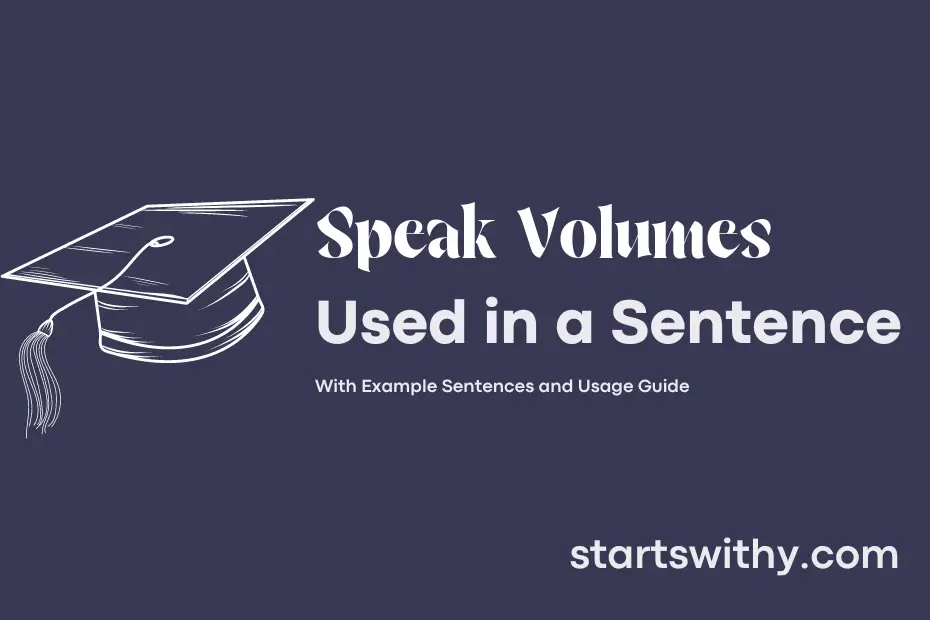Have you ever heard the phrase “speak volumes” and wondered what it means? In a nutshell, this expression signifies that something communicates a large amount of information or emotion without the need for words.
When an action, expression, or situation speaks volumes, it is conveying a powerful message that is easily understood and impactful. This phrase is often used to emphasize the importance or significance of non-verbal cues in communication.
7 Examples Of Speak Volumes Used In a Sentence For Kids
- Smiling at someone can speak volumes without any words.
- Holding hands with a friend can speak volumes about how much you care.
- Sharing your toys with others can speak volumes about your kindness.
- Listening quietly when someone is talking can speak volumes about your respect.
- Giving a big hug can speak volumes about how much you love someone.
- Offering help to a friend can speak volumes about your willingness to support them.
- Saying “thank you” can speak volumes about your appreciation for someone’s kindness.
14 Sentences with Speak Volumes Examples
- Attending extracurricular activities and taking on leadership roles speak volumes about your initiative and dedication.
- Participating in debates and discussions with your peers can speak volumes about your critical thinking skills.
- Volunteering for community service projects can speak volumes about your compassion and empathy.
- Managing your time effectively to balance academics and social activities speak volumes about your organizational skills.
- Collaborating with classmates on group projects can speak volumes about your teamwork and communication skills.
- Seeking help from professors or peers when you’re struggling with a subject can speak volumes about your willingness to learn and grow.
- Taking the initiative to start a new club or organization on campus can speak volumes about your leadership abilities.
- Sharing your knowledge with others by tutoring fellow students can speak volumes about your expertise in a particular subject.
- Being actively involved in student government can speak volumes about your commitment to making a difference on campus.
- Writing thought-provoking essays or articles for the college magazine can speak volumes about your creativity and literary skills.
- Taking on internships or part-time jobs to gain hands-on experience can speak volumes about your determination and work ethic.
- Participating in cultural or sports events can speak volumes about your appreciation for diversity and teamwork.
- Attending workshops or conferences to enhance your skills and knowledge can speak volumes about your dedication to personal and professional growth.
- Engaging in research projects or presenting papers at conferences can speak volumes about your academic curiosity and intellectual capabilities.
How To Use Speak Volumes in Sentences?
Speak Volumes means to convey a lot of meaning or information through one’s actions, words, or appearance.
When using Speak Volumes in a sentence, remember that the phrase is often used to describe something that is very noticeable or significant. For example, “Her smile spoke volumes about her happiness.” In this sentence, the phrase indicates that her happiness was clearly expressed through her smile, suggesting that she was feeling very joyful.
To effectively use Speak Volumes in a sentence, consider the context and tone of the situation. Think about what message or meaning you want to convey and how you can best express it through your words. For instance, “His silence speaks volumes about his disappointment.” In this case, the sentence suggests that the person’s quiet demeanor reveals his feelings of disappointment without him having to say a word.
Remember that Speak Volumes is a versatile phrase that can be applied in various situations to emphasize the impact or significance of something. Practice using it in different contexts to become more comfortable incorporating it into your everyday language.
Conclusion
In summary, the phrases and actions we choose can often speak volumes about our thoughts, feelings, and intentions. From body language to tone of voice, subtle cues can reveal a great deal about a person’s true emotions and beliefs. Whether it’s a simple gesture or a carefully crafted statement, these “sentences” without words can convey powerful messages that others may pick up on.
It is essential to pay attention to the non-verbal cues we are sending and to be mindful of how our words and actions align. Understanding the impact of these silent communicators can help us communicate more effectively and build stronger connections with those around us. Ultimately, the adage that actions speak louder than words holds true, highlighting the importance of recognizing and interpreting the subtle language that can speak volumes.



